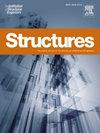Isotherm maps of temperature gradient for CFST in China: Statistical evaluation using long-term meteorological data
IF 4.3
2区 工程技术
Q1 ENGINEERING, CIVIL
引用次数: 0
Abstract
Bridge codes tend to employ generalized temperature gradient specifications derived from historical extremes. These provisions neglect site-specific environmental interactions that critically influence thermal behavior. The varied environments increase the uncertainty of temperature gradients. This study develops geospatially refined temperature gradient models for concrete-filled steel tube (CFST) bridges through isotherm maps. Long-term historical meteorological data from 839 stations in China were collected, and missing solar radiation data were supplemented using the Bahel model. A “layer-by-layer” method for temperature gradient isotherm maps is proposed. Long-term simulations of the temperature field at 91 radiation stations were carried out based on meteorological data. Meanwhile, the formulas for predicting the temperature gradients based on meteorological parameters were established. Then, Peak over threshold model based on the generalized Pareto distribution was used to calculate the temperature gradient loads at each meteorological station with a 100-year return period. Finally, the spatial interpolation method was used to draw the isotherm contour maps of temperature gradients. The results show that the temperature gradients of CFST bridges in China vary significantly across different regions. The regional differences can reach up to 17.91°C. Therefore, the specified values of temperature gradient for CFST bridges may lead to non-conservatism in design for most regions in China. Compared to the current specification, the temperature gradient isotherm maps presented in this paper offer enhanced geographic resolution. This will contribute to the more refined design of CFST bridges in China and serve as a valuable supplement to the Chinese specifications.
中国CFST温度梯度等温线图:利用长期气象资料的统计评价
桥梁规范倾向于采用从历史极值推导出的广义温度梯度规范。这些规定忽略了对热行为有重要影响的特定地点的环境相互作用。变化的环境增加了温度梯度的不确定性。本研究通过等温线图建立钢管混凝土(CFST)桥梁的地理空间精细温度梯度模型。利用Bahel模式对中国839个台站的长期历史气象资料进行了分析,并对缺失的太阳辐射数据进行了补充。提出了一种逐层绘制温度梯度等温线图的方法。利用气象资料对91个辐射站的温度场进行了长期模拟。同时,建立了基于气象参数的温度梯度预测公式。然后,采用基于广义Pareto分布的峰值超过阈值模型,计算了各气象站100年的温度梯度负荷。最后,采用空间插值法绘制温度梯度等温线等值线图。结果表明,中国CFST桥梁的温度梯度在不同区域之间存在显著差异。区域差异可达17.91°C。因此,在中国大部分地区,钢管混凝土桥梁温度梯度的规定值可能导致设计的非保守性。与现有规范相比,本文提出的温度梯度等温线图具有更高的地理分辨率。这将有助于中国CFST桥梁的更精细设计,并对中国规范进行有价值的补充。
本文章由计算机程序翻译,如有差异,请以英文原文为准。
求助全文
约1分钟内获得全文
求助全文
来源期刊

Structures
Engineering-Architecture
CiteScore
5.70
自引率
17.10%
发文量
1187
期刊介绍:
Structures aims to publish internationally-leading research across the full breadth of structural engineering. Papers for Structures are particularly welcome in which high-quality research will benefit from wide readership of academics and practitioners such that not only high citation rates but also tangible industrial-related pathways to impact are achieved.
 求助内容:
求助内容: 应助结果提醒方式:
应助结果提醒方式:


